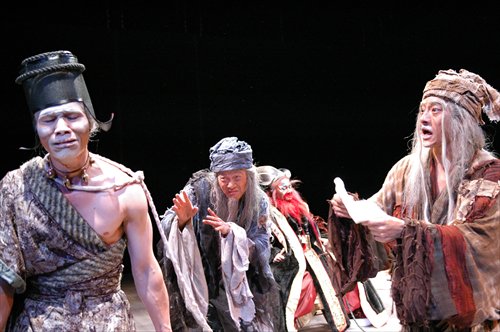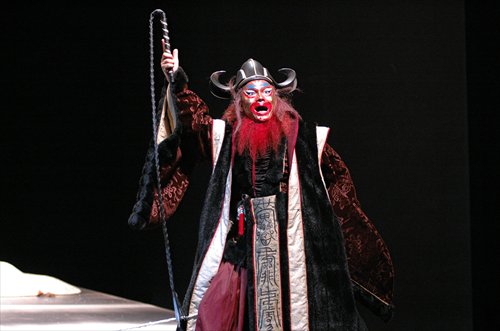HOME >> METRO SHANGHAI
Godot goes east
By Sun Shuangjie Source:Global Times Published: 2015-8-11 17:33:01
Production introduces elements from Peking Opera to Beckett’s classic play
It took three years for Samuel Beckett to persuade publishers to put out Waiting for Godot, which went on to become one of the most celebrated plays in history, with numerous productions staged across the globe since its first performance in 1953. It took Taiwanese director Wu Hsing-kuo longer to convince people that his idea for a version of the classic infused with the stylization of Peking Opera was a good idea.
Produced by Contemporary Legend Theatre (CLT) in Taipei in 2005, Wu's Waiting for Godot has been performed in Europe and Asia to widespread acclaim.
The show, which first came to Shanghai in 2006, returns this week, and will be performed on Friday and Saturday at Shanghai Culture Square.
Nowadays, people characterize this show with such positive tags as "an encounter between an ancient art form and a modern script" and "a mixture of tragedy and comedy that crosses the borders of drama and Chinese opera."
However, when Wu first put forward his plan for this show in 1997, the responses ranged from ridicule to indifference.

Twisting the lion's tail
Taiwanese actor, playwright and director Chin Shih-chieh said that he was surprised by Wu and jokingly said that Wu was "twisting the lion's tail."
Beckett's play was voted most influential play of the 20th century by British National Theatre and has become a masterpiece of the "theater of the absurd."
When Wu came up with his idea to combine it with Chinese opera, an ancient and remote art form from the modern Western play, many saw it as a fool's errand.
But Wu persuaded Chin, a huge fan of Waiting for Godot, to become the artistic director of CLT's production. Before 1997, Wu had successfully adapted several Western classics such as Shakespeare's Macbeth and Hamlet.
CLT's production of Waiting for Godot follows the original story of two men, Gogo and Didi, as they wait for a person known as Godot who never comes. During their wait, they meet another two men, Pozzo and his servant Lucky. The play explores the meaninglessness of existence and our relationship with time and memory.

Accentuating the absurd
Chin suggested doing the show infused with the spirit of clowning to reinforce the absurd sense of the original play. Actors are dressed raggedly and wear long gray-white eyebrows and beards, and the way they behave incorporates moves from Chinese Peking Opera.
As always, the copyright management firm for Beckett's estate would not allow background music in the performance. But Wu delivers the text of the play, which is translated to poetic and carefully balanced lines of Chinese, in a cappella singing styles from Peking and Kunqu operas.
Wu told the Global Times he was very nervous when the work debuted in France in 2009, but the reception was good. Ariane Mnouchkine, founder and stage director of avant-garde Le Theatre du Soleil, told Wu that he was a bit angry when he saw the costumes and makeup at the beginning of the show.
However, after watching the whole production, Mnouchkine came to feel that the staging was appropriate, and made it seem like the play had been created for CLT.
From West to East
CLT's production translated Godot to "Guotuo" in Chinese, in which "guo" stands for preordained fate and "tuo" stands for the Buddha.
"I've always believed there is a Buddha in every person in the East, and the Buddha represents morality, conscience and a person's quality. I look at the story of the play from the perspective of the sincere belief in Buddha in the East," said Wu in a recent interview with Yin Yuan Friends.
Gogo and Didi are translated to "Kuku" and "Titi," which together literally means "weep and cry" in Chinese. In Wu's eye, though the difficult period of World War II that influenced Beckett has passed, personal struggles for meaning in life still carries on and, in some ways, have become even harsher today.
"Today we don't fight wars, but there are more people who commit suicide than before," Wu told the Global Times. "People enjoy more freedom are more open-minded, but in the long wait of life, they still need to find something to help them pull through."
For Wu, combining Chinese operas with this classic play is a way of finding meaning and fulfillment in the waiting that is life.
Date: Friday and Saturday, 7:15 pm
Venue: Shanghai Culture Square
Address: 597 Fuxing Road Middle
复兴中路597号
Tickets: 80 yuan ($12.88) to 480 yuan
Call 6472-9000 for details
Produced by Contemporary Legend Theatre (CLT) in Taipei in 2005, Wu's Waiting for Godot has been performed in Europe and Asia to widespread acclaim.
The show, which first came to Shanghai in 2006, returns this week, and will be performed on Friday and Saturday at Shanghai Culture Square.
Nowadays, people characterize this show with such positive tags as "an encounter between an ancient art form and a modern script" and "a mixture of tragedy and comedy that crosses the borders of drama and Chinese opera."
However, when Wu first put forward his plan for this show in 1997, the responses ranged from ridicule to indifference.

Twisting the lion's tail
Taiwanese actor, playwright and director Chin Shih-chieh said that he was surprised by Wu and jokingly said that Wu was "twisting the lion's tail."
Beckett's play was voted most influential play of the 20th century by British National Theatre and has become a masterpiece of the "theater of the absurd."
When Wu came up with his idea to combine it with Chinese opera, an ancient and remote art form from the modern Western play, many saw it as a fool's errand.
But Wu persuaded Chin, a huge fan of Waiting for Godot, to become the artistic director of CLT's production. Before 1997, Wu had successfully adapted several Western classics such as Shakespeare's Macbeth and Hamlet.
CLT's production of Waiting for Godot follows the original story of two men, Gogo and Didi, as they wait for a person known as Godot who never comes. During their wait, they meet another two men, Pozzo and his servant Lucky. The play explores the meaninglessness of existence and our relationship with time and memory.

Two scenes from the CLT production of Waiting for Godot Photos: Courtesy of Shanghai Culture Square
Accentuating the absurd
Chin suggested doing the show infused with the spirit of clowning to reinforce the absurd sense of the original play. Actors are dressed raggedly and wear long gray-white eyebrows and beards, and the way they behave incorporates moves from Chinese Peking Opera.
As always, the copyright management firm for Beckett's estate would not allow background music in the performance. But Wu delivers the text of the play, which is translated to poetic and carefully balanced lines of Chinese, in a cappella singing styles from Peking and Kunqu operas.
Wu told the Global Times he was very nervous when the work debuted in France in 2009, but the reception was good. Ariane Mnouchkine, founder and stage director of avant-garde Le Theatre du Soleil, told Wu that he was a bit angry when he saw the costumes and makeup at the beginning of the show.
However, after watching the whole production, Mnouchkine came to feel that the staging was appropriate, and made it seem like the play had been created for CLT.
From West to East
CLT's production translated Godot to "Guotuo" in Chinese, in which "guo" stands for preordained fate and "tuo" stands for the Buddha.
"I've always believed there is a Buddha in every person in the East, and the Buddha represents morality, conscience and a person's quality. I look at the story of the play from the perspective of the sincere belief in Buddha in the East," said Wu in a recent interview with Yin Yuan Friends.
Gogo and Didi are translated to "Kuku" and "Titi," which together literally means "weep and cry" in Chinese. In Wu's eye, though the difficult period of World War II that influenced Beckett has passed, personal struggles for meaning in life still carries on and, in some ways, have become even harsher today.
"Today we don't fight wars, but there are more people who commit suicide than before," Wu told the Global Times. "People enjoy more freedom are more open-minded, but in the long wait of life, they still need to find something to help them pull through."
For Wu, combining Chinese operas with this classic play is a way of finding meaning and fulfillment in the waiting that is life.
Date: Friday and Saturday, 7:15 pm
Venue: Shanghai Culture Square
Address: 597 Fuxing Road Middle
复兴中路597号
Tickets: 80 yuan ($12.88) to 480 yuan
Call 6472-9000 for details
Posted in: Metro Shanghai, Culture